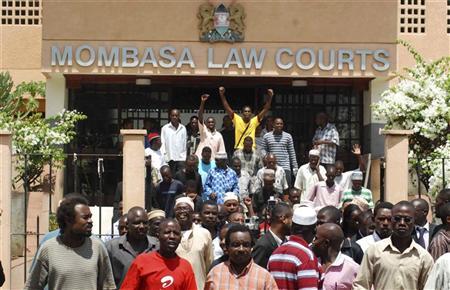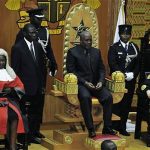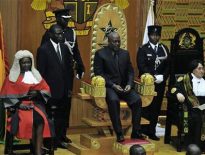By Joseph Akwiri
MOMBASA, Kenya (Reuters) – Kenya’s High Court lifted a ban on Wednesday on a separatist group whose campaign for the secession of the country’s coastal strip and famed tourist haven has unnerved investors and raised fears of violence.

The Kenyan government outlawed the Mombasa Republican Council (MRC) in 2010 along with 33 entities it described as “organised criminal groups”. But the Mombasa-based court ruled that the ban was unconstitutional.
The ruling could pave the way for talks between the MRC and the government, which has ruled out negotiating with an outlawed group. However, the government said it would appeal the decision and showed no immediate sign of softening its stance toward the movement.
Hundreds of MRC supporters marched in the streets on Mombasa city, Kenya’s second largest, waving twigs and shouting ‘Pwani si Kenya’ or ‘The Coast is not Kenya’ after the group won its case to reverse the ban on its activities.
In its ruling, the three-judge court said there was no evidence that the group had engaged in any criminal activity. It said the MRC, like any other Kenyans, has rights under the law including that to promote a political agenda that called for secession.
Justice Francis Tuiyot, however, stressed that any call for secession must be expressed in a fair and democratic manner – and in no way incite war, violence or hate speech.
He said the MRC should be registered as a political party, and that the court’s decision should not be seen as an endorsement of secession.
“The court has been able to deduce that MRC is a political movement. Secession is a political agenda. The court therefore grants MRC a chance to enjoy their political right. They should organise and register as a political party,” Tuiyot said.
In a statement, Attorney-General Githu Muigai said he would appeal the court’s decision.
“Any group or organization challenging the constitutional authority and territorial integrity of the Republic of Kenya cannot enjoy protection by the constitution,” he said.
The statement did not say when the appeal would be filed.
President Mwai Kibaki has flatly rejected the MRC demand for secession, refusing any negotiations on this point. Other grievances raised by the group include the lack of jobs and land for the indigenous people of the coast.
The MRC chairman has said the group would boycott and disrupt voting on the coast in national elections scheduled for March 2013 if its demand for secession is not met by authorities in the capital, Nairobi.
Analysts fear this could turn the tourist hotspot – with its sandy beaches and pristine waters a jewel in the East African nation’s economy – into a potential flashpoint, fuelling wider fears of ethnic violence and riots during the elections.
“The ruling will ease the tension. Both sides now need to talk,” said Mzalendo Kibunjia, who heads a national agency formed to reconcile tribes after post-election violence in 2007 killed more than 1,200 people.
‘RAMADAN GIFT’
The MRC spokesman, Mohamed Mraja, welcomed the ruling.
“This is a wonderful Ramadan gift for all of us,” Mraja, clad in a Muslim cap and flowing white robe, told reporters. The holy fasting month of Ramadan is currently under way.
Mraja said he would circulate copies of the ruling to all police stations and courts around the coast, where he said more than 200 of the group’s members were being held on charges of belonging to an illegal group, so that they can be released.
About 100 police officers in helmets and armed with clubs and tear gas canisters kept a close watch on the chanting demonstrators, shepherding them through traffic in the busy streets. Many demonstrators had walked from far-flung corners of the coast region to hear the ruling.
“I am so excited. People back home are already celebrating,” said Nuru Kadzo, a 32-year-old housewife who said she had travelled from the town of Hola 400 km (250 miles) away. “Today I will break my fast with a lot of joy.”
MRC says it has documents of what it says is a 1963 accord signed by then-Prime Minister Jomo Kenyatta, later president, and Zanzibar counterpart Mohamed Shante granting Kenya a 50-year lease over the coast. This would expire in June 2013, when the land should return to its indigenous people, the MRC argues.
But the Kenyan government and historians in Nairobi have dismissed the treaty as a forgery and MRC propaganda.





